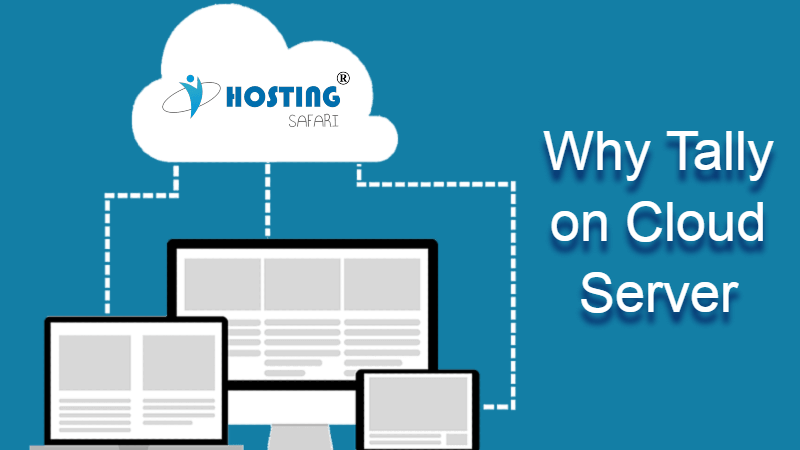Why the Best Cloud Servers for Tally Software?

Cloud servers are best suited for Tally software for several reasons. Firstly, cloud servers offer high scalability and flexibility, allowing businesses to easily scale up or down their Tally usage as per their requirements. This is particularly useful for businesses with fluctuating workloads or seasonal demands.
Secondly, cloud servers offer high availability, ensuring that Tally software is accessible 24/7, without any downtime. This is critical for businesses that rely heavily on Tally software for their day-to-day operations.
Thirdly, cloud servers offer high levels of security, ensuring that Tally data is protected from cyber threats and data breaches. This is particularly important for businesses that handle sensitive financial data.
Finally, cloud servers are cost-effective, as they eliminate the need for businesses to invest in expensive hardware and IT infrastructure. This makes it easier for small and medium-sized businesses to leverage Tally software without incurring huge capital expenses. Overall, cloud servers provide an ideal platform for businesses to run Tally software efficiently and effectively.
What is Tally on Cloud?
Tally on Cloud refers to the deployment of Tally software on cloud servers instead of on-premises servers. This means that Tally software can be accessed over the internet using a web browser, allowing businesses to use it from anywhere, at any time. Cloud deployment provides businesses with high scalability, flexibility, security, and cost-effectiveness, as it eliminates the need for businesses to maintain their own hardware and IT infrastructure. Tally on Cloud also ensures high availability and eliminates the risk of data loss, as data is stored on secure cloud servers with automatic backups.
What are the benefits of tally on cloud?
-
Many companies have switched to cloud servers for a variety of reasons.
-
You can access Tally data at any time and from any part of the world with Tally On Cloud
Yes, that’s correct! Tally on Cloud offers the ability to access Tally data from anywhere in the world, at any time, provided you have an internet connection. This is particularly useful for businesses with remote workers or distributed teams, as they can access Tally data from any location, without being tied to a specific office or location.
With Tally on Cloud, users can access Tally software via a web browser or remote desktop connection, which allows them to work with the software in the same way as they would with an on-premises installation. This means that users can perform all Tally-related tasks, including invoicing, accounting, inventory management, and financial reporting, with the same level of functionality and performance as an on-premises installation.
Tally on Cloud also provides businesses with high availability and redundancy, as Tally data is stored on secure cloud servers with automatic backups. This ensures that data is always accessible, and there is no risk of data loss due to hardware failure or other issues.
In summary, Tally on Cloud provides businesses with the flexibility, scalability, security, and cost-effectiveness they need to efficiently manage their accounting and financial operations, from anywhere in the world.
-
The data is stored in a highly safe and secure environment and is encrypted
-
Yes, that’s correct. When using Tally on Cloud, data is stored on highly secure and reliable cloud servers. These servers are hosted by reputable cloud service providers who implement industry-standard security measures to ensure the safety and confidentiality of data.
The data is typically encrypted both in transit and at rest. This means that data is protected while it is being transmitted between the client device and the cloud server, as well as when it is stored on the server. Encryption ensures that data cannot be intercepted, viewed, or modified by unauthorized parties, thus protecting it from cyber threats such as hacking and data breaches.
In addition to encryption, cloud service providers typically implement other security measures such as firewalls, intrusion detection and prevention systems, and access controls. These measures help to prevent unauthorized access to the servers and data, and mitigate the risk of data loss or theft.
Furthermore, Tally on Cloud providers often offer additional security features such as regular backups, disaster recovery solutions, and 24/7 monitoring and support. These features help to ensure the continuity and availability of Tally data, even in the event of a disaster or other unforeseen circumstances.
Overall, using Tally on Cloud offers businesses a high level of data security and protection, which is critical for managing sensitive financial data. By entrusting their Tally data to reputable cloud service providers, businesses can focus on their core operations while knowing that their data is safe and secure.
-
No device dependency:
The quality of the equipment can affect your ability to access the information you require because traditional tally software rely on devices. You don’t need to worry about the gadget if Tally is in the cloud.
With cloud computing, you need not worry if your device crashes or gets misplaced. With the assistance of any other device, you can continue working on the same project. You don’t have to keep your data in a single application because it can be accessible from any device, thus you don’t need to. This facilitates mobility and increases accessibility anytime you need it from anywhere in the world.
-
No additional expense:
The time and money that would have been spent on setting up new infrastructure for data exchange are greatly reduced thanks to Tally on Cloud. To choose the cheapest and most convenient Tally on Cloud service provider, go to Hosting Safari. Because Tally on Cloud is so simple to set up, users may easily access any vital information. The ideal solution for storing your company’s data is Tally on Cloud because no additional infrastructure expenditure is necessary.
Utilising cloud computing makes it easier to communicate and collaborate with the relevant stakeholders. It enables seamless teamwork so that you may stay in touch with the affected team members. You can access solutions that favourably impact your business demands with the correct cloud server. Hosting Safari’s cloud services let you organise your data without consolidating it.

